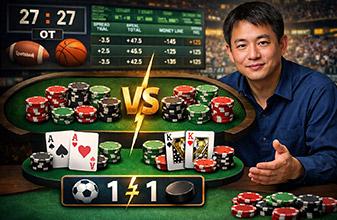Learning Poker

I never sat down at a blackjack table until I had Basic Strategy down cold. Kind of the same thing for poker, I never sat down at a poker table until I had read Winning Low Limit Hold'em by Lee Jones and memorized the starting hand requirements.
If you really want to get serious about playing poker, you first have to ask yourself what you want to accomplish. My two reasons were lower variance and no backoffs. The lower variance part meant that I would play limit poker and no tournaments. However, I understand that many people are good at playing no-limit or tourneys, so you first should determine that in your personality.
Next, you should ask yourself which game you want to play. For the beginning, hold'em should be fine, but just remember, it is not everything. Since players have read up so much on hold'em, it will be really hard to find a true “fish” (loose and passive). Many people understand that you have to be tight/aggressive to win and although 95% of the players don't play tight/aggressive, they are not totally dumb either (many grey levels).
I've had success with Omaha 8, for example, as there are so many possibilities involved that it fits my style very well. Many newbies don't know the starting requirements for Omaha 8 and can't read the board well (e.g. if there are two pairs on the board, there is no full house if you have one of the cards, or how to read the nut low). BB/hour is higher, but also is the variance.
If you live on the east coast, 7 card stud is a nice analytical game (the hi/lo option makes it a bit more difficult, but that's only good for the knowledgeable player). It seems that 7 card stud takes a little longer to master, but once you know when to get out or when to take charge, it's great, because so many people chase with bad pot odds.
A big decision is, if you want to play in an actual (“bricks and mortar” or “B&M”) casino or online. I like B&M-play better as I have people in front of me, with personalities and facial expressions. Although you don't get that many hands/hour, you get the social element and the profit rate should not change. Probably the best option is to play hold'em, just because so many casinos offer it. If you really just want to get into the mechanics of the game download any ".net" Poker-software and play for free. Do not learn strategy this way, but only when you should bet, how much, etc. If you have a table with starting hands related to position, it will also be nice way to memorize those (practice, practice, practice).
For online real money play, I suggest to not play micro limits, because it won't teach you anything and will make you play very loosely, so that you will get killed in a live casino. As a rule of thumb I have discovered that the level of play is online about the same as 4x limits in B&M. So, if you have mastered the 4/8 game at the Wynn, you should do well at the 1/2 game online, but the 4/8 game online will generally be tougher.
After about 5,000-10,000 hands online or 100 hours at a casino (again, the people element is very important in hold'em -- that's why it will take a bit longer online), you will have discovered many nuances of the game: power of position, value betting, semi-bluffing, etc. It is then that you move up in level of books.
Pi Yee Press publishes King Yao's Weighing the Odds in Hold 'em Poker











Please log in or register to leave a comment